Hustle Culture and it’s Consequences
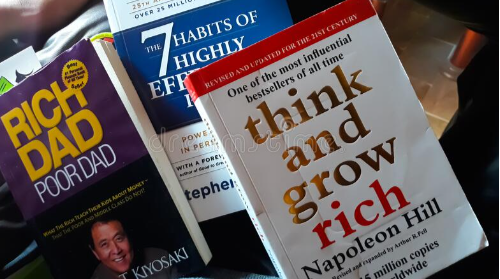
April 20, 2023
“Hustle Culture, the “brilliant” idea of working oneself to the bone till burnout in pursuit of a long-term goal, usually career-wise.”
Hustle Culture Influence Over Gen Z
Hustle Culture has certainly made its presence known in recent years, with an explosion of influencers across thousands upon thousands of users’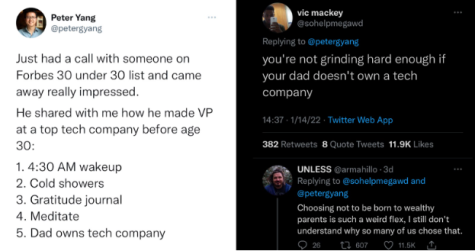 explore pages, ranging from Andrew Tate to Gary Vee, which often display the mantra of “bettering one’s self”.
explore pages, ranging from Andrew Tate to Gary Vee, which often display the mantra of “bettering one’s self”.
Though is it as positive as influencers like them make it out for the general consensus to believe? Or is there something that isn’t quite right with the ideologies that are pushed out?
Payment Received In ‘Good Feelings’
For many, hustle culture is believed to be a newly crafted idea for the 21st century, but it is much, much older than that, and in fact was not created by the simple, common man.
Hustle culture first took form during the 1860s, at the height of the Industrial Revolution. This was a time in which there were no established worker rights, child labor was rampant, and companies didn’t care for the livelihoods of their workers. Simply, being replaced with a wag of a finger (nothing’s changed, companies now just put a front up of caring).
At this time, employees often worked around the clock, averaging at about 68 hours per week. Calculated to a daily standard, that is 9 hours of often unrested, limited break work – and that’s only taking no off-days into account.
1938 would mark some unbridled change in American factory life, which was near the end of The Great Depression, a time where many Americans were jobless, hungry, desperate, and broken. President Franklin D. Roosevelt would sign the Fair Labor Standard Act that year, which basically imposed an eight-hour workday and the option for overtime.
The introduction of overtime was ultimately good for the people, but it was more of a mask, not only to stifle the voices of those who complained about their work wages, but benefit the company in the long term as well.
Companies may be paying more temporarily, however, they really win in the long term saving far more. The cost of marketing, training, and retention of new hires is much more than giving out overtime to veteran workers (not to mention that the union does have to provide their benefits for every new hire). This is valid even in today’s workforce.
Now, enough with the history lesson- why not fast forward into what is happening now.
The New Influencer
Once or twice, or maybe even many of times in your mindless miles of scrolling, you’ll come across a video of someone discussing their “day in a life as an entrepreneur”. They’ll describe to their loyal, devoted, and arguably brainwashed viewers that they too can become like them: successful, entrepreneurial, influential, and independent.
All you have to do is work for it, not just work for it, but keep working for it. Work into the wee hours of the morning, work while you eat, work during the slight free time you may have, work until you feel the ache in your bones, because you know it’s working then – work, work, work.
We’ve curated our generation and future generations to be these obsessed workaholics, that follow the mentality that “if it hurts, then you’re doing it right”.
Generation Z itself has been on a very direct pipeline to claim the title as most entrepreneurial of recent generations. CNBC found that over 48% of the generation work on a “side hustle” on top of their main job. It goes to show the influence that the internet has on painting the facade that working your own business is guaranteed success.
American Psycho
How exactly do these individuals plan to fit these side hustles into their schedules? It seems that many modify their schedules to fit work in every facet of their everyday lives.
Quite frankly, I’ve always imagined these obsessed hustlers as “little American psychos”, and from certain videos showing these “day in my life” routines, it certainly does look like that.
Some push out these rigorous routines that don’t cater to human needs, but rather one that can only be completed by a machine that only does what it is tasked with.
They’ll perpetuate this standard of living that not everything has to be pleasant, that with hard work comes pain. This may be true, but it’s those little instances in life that help remind us what we do all this work for, and by taking those little moments out, what are we living for?
It’s like taking a lunch break. Though it’s seen by corporations and many workaholics as just a time to accommodate our human bodily needs, it is so much more than that. It is a time where our minds can become refreshed, where they are truly able to rest from the taxation they have received.
I can admit at times myself that I have been annoyed by just how hungry I get when I’m truly in the zone, but when I take that break, when I bite into that meal I’ve been craving – it reminds me just how much I needed it.
Or even taking a nice hot shower. Maybe having a cold shower might be much more beneficial in a lot more aspects, but can’t a person deserve a nice reward like a hot shower as their reward? I doubt many of these American psychos don’t love doing it too.
Not everything needs to be some mental-mind training, because sometimes, you just need to stop and smell the flowers once in a while.
Yet, maybe it is American Culture itself which finds a difficulty in maintaining balance between leisure time and work time. It would be selfish to put all blame on the common people, when they are merely confined to a structure that is set up for them to follow.
For example, European and Asian countries follow a much different criteria when discussing the topic of maternal leave for a mother and father. Denmark, Sweden, Norway, South Korea, and Japan are only a few countries out of 120 that give paid maternity leave to the parents.
America does not provide this privilege, instead only giving leave time off with no guaranteed pay, which can be stressful on both children and parents.
Americans have conditioned themselves to be hustlers by nature because they have to be in certain cases.
We Are Only Human After All
The idea that we are only human goes as a foreboding warning as well, that when you decide to push yourself past your limits, it could have two outcomes, or both: success and a complete breakdown.
I’ve seen far too many who have exuded this workaholic personality-type, who have utterly crashed and burned because they didn’t have a healthy balance introduced to their lifestyle.
Working more than 10 hours every single day isn’t healthy in any sector of work, because it is in those environments where the risk of burnout or even a possible nervous breakdown becomes heightened.
If you think entrepreneurship is any better, or any less stressful, then you are sadly wrong. In a study done by the University of California San Francisco, it was reported that mental health was present across 72% of the entrepreneurs that were participants in the study. Compared to the average person, entrepreneurs are known to be more likely to be diagnosed with ADHD.
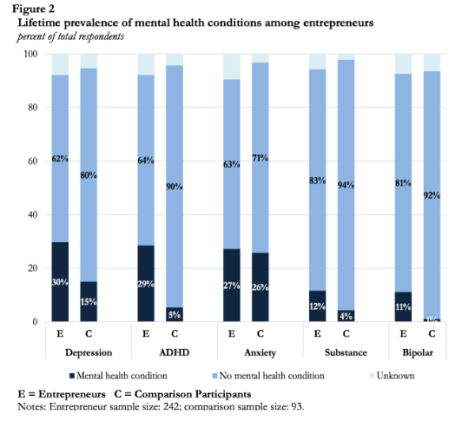
Mental health must be prioritized when considering whether you want to take part in the “hustle” of your career and work-life because sooner or later, it will consume you.
A deterioration of your mental state won’t affect only you, but the relationships that you once cherished can become destroyed.
We are only humans, after all. We’re social creatures who crave social interaction with one another, despite some of our beliefs that we do not need it to survive. Everything should be done in moderation.
The Lost Will Stray To Influence – SelfHelp Books
Self-help books are sometimes what many people who are lost, or just need the proper motivation to get in the swing of things, lean on. They are books that give us clear instructions, telling us what will be the best piece of advice for us to follow.
Now, this section is not meant to be a slander nor disapproval of self-help books – but merely an introduction to two sides of the spectrum of what these genres of books offer.
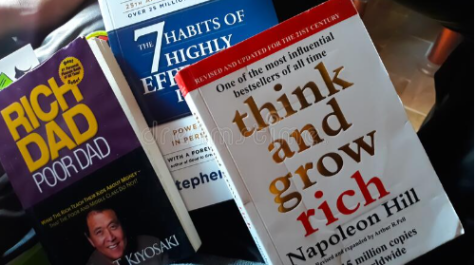
One version of the self-help book genre that I would like to go into more depth with, is the “success story”. The success story is a popular genre of books written by big-shots, who once, just like you, have been down on their luck, and who eventually overcome them that dry spout of their life. And what else do they mention? Oh! That’s right, you too can become like them through risk-taking and a positive mindset!
Robert Kiyosaki is one of the entrepreneur big-shots who showcases just that, and fortunately, I was able to read several of his books in order to become well-acquainted with, one being Rich Dad, Poor Dad.
If I had to take out all of the fluff in this book, I’d have between ten and fifteen pages of somewhat meaningful advice that’s given to the reader. The advice that is given though – well, I wouldn’t even bother to follow it myself. In short, it pushes out the narrative that when given the chance, you should always take the biggest risk to maximize your profits, which isn’t wrong – but it heavily leans on luck that isn’t a definite promise.
What I don’t like about this, is that the book hones in on people who aren’t financially stable, giving them this unhealthy mindset of “betting on your luck”. Even when in regards to Kiyosaki writing this book towards those in the middle class, I couldn’t help but blatantly notice the arrogance that was laced within his words, that he somehow saw himself as better than others.
I kid you not, this is a direct quote from Rich Dad, Poor Dad: ”Job is an acronym for: just over broke”
Business men like him don’t get rich from hustling, they make themselves rich off the backs of those who purchase and support these types of books. It’s a complete pyramid scheme set up, especially when individuals like this offer “classes” that help teach you finance and such.
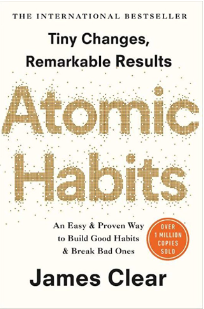
Now, here is a book that I would recommend to those who really want to embody a positive, more practical lifestyle. Rather than the Rich Dad, Poor Dad-type self help book, this book enacts positive changes in one’s lifestyle rather than promoting unhealthy financial habits.
Atomic Habits doesn’t encourage the audience to directly invest in the author’s personal financial classes, but gives one-on-one helpful information, like how you would receive from a friend of yours. It tells you ways you can improve your lifestyle simply by changing the habits that you follow day-to-day.
Of course, changing one’s habits isn’t as simple as that, they are called habits for a reason, but, Atomic Habits gives a rather detailed explanation of how we can overcome certain aspects of the things we fall prey to that aren’t great habits of ours in our daily lives.
To break an unhealthy habit and to truly achieve success, you need to think not of the goal you have in mind, but the person who you want to become. It doesn’t push the idea of hustling to achieve it, as that is impractical (and will make you less prone to taking on productivity due to burnout), but self-improvement by your own standards.
The Immigrant’s Standard of Hustling
There are differing opinions to what hustle culture means, and certainly there are many who believe that hustling is the definite key to success. One group above all, holds this value dear: the immigrant.
Immigrants are by far the most hard-working individuals of every country, some having escaped war-torn homes, and others who just seek the economic opportunities other countries possess. There are a number of reasons that many will leave their country, but one thing is for certain, the hustle for what they got.
Usually, it’s quite hard for many to come up from nothing, and many will stay in dead-end jobs they obtained when they first arrived. Obviously, this isn’t always the case, like Donut King Ted Ngoy, who built up wealth off of a Donut Empire (though he did end up losing it all to a gambling addiction). However, it’s often a stroke of luck that determines if someone will be given the opportunity to rise up from their standings – which is why immigrant families often turn to their children to become the breadwinner, the one who will defy all odds.
It’s often the biggest contributing factor as to why you see most immigrant families push their children to seek high income jobs in the law, medicine, or business sector (Check out a Forbes article on this interesting phenomenon here).
Who wouldn’t want the best for their children? Even if it means pushing them past their limits in order to help them grow. Immigrant families are hustlers, and often that hustle does pay off in the end.
Is Hustling Good or Bad?
There is no definite category to place hustling in, and even then, “good and bad” is far too vague of a descriptor.
Hustle culture can be rewarding in certain ways, but it can also be quite destructive to a person physically and mentally.
In recent years, hustling has entered every space of our livelihoods. Surely, there are countless videos perpetuating how beneficial hustling is without outlining how truly awful it can be at times. These videos have promoted masses of people to start by utilizing their hobby, something that is supposed to be seen as an activity away from work, not to be included in the aspect of work.
Believe me, when I tell you going down that road can be euphoric in the beginning, but it tears you down completely, especially when you become consumed by stats and figures rather than the fun you usually held towards something you once loved.





















